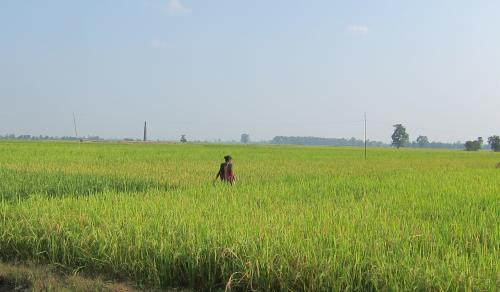
In the second blog from 'Valuing Volunteering' to celebrate International Volunteer Day, I tell the story of Maya, a teacher who worked with an international VSO volunteer... The story illustrates how important relationships are to achieving change, but asks how can long-term change be sustained if changes at the individual level aren't matched by changes in the wider system?
We sit in Maya’s* classroom and she tells me about the last eighteen months. I remember when I first met Maya, and how hard it was for us to communicate: she was shy, slightly suspicious and confused as to why I had come. That was over a year ago now, when she had been working with the VSO Education volunteer for less than six months.
An Early Child Development (ECD) teacher in the Far West of Nepal – a region with historically low government and aid investment – Maya is also from one of Nepal’s most marginalised ethnic groups. She tells me about what life had been like as an ECD teacher: ‘I was blind in my work. I’d look at my watch all the time. My role was just to stop the children when they started fighting’. With little training, few qualifications and low pay, ECD teachers often find themselves at the bottom of the school hierarchy with little financial or professional support. Parents also have a limited understanding of ECD, and children aged under 18 months would sometimes be left in Maya’s class.
Maya tells me how nervous she was before the volunteer came and how she thought she was there to check on her. She explains that she was also excited because they needed help: ‘Nepal is backward in Education’ she says, reflecting a widespread low self-esteem in Nepal’s development, and perhaps over-estimation of ‘developed’ countries successes. This, along with the language often used by both volunteer organisations and schools to describe volunteers, for example, ‘expert’ and ‘specialist’, and the way that programs are often monitored and evaluated (e.g. with requirements to observe and rate classes from the start), can help to create the idea that its a one-way process: the volunteer is there to teach, to instruct them on how to change.
People are sensitive to language, and to the way in which success is evaluated: it can be a difficult terrain for both volunteer and those they work with to negotiate. But Maya goes on to tell me about what it was that brought a change in her and to her classroom. It wasn’t that the volunteer taught her ideas that she didn’t know before. She had training from local NGOs and from other teachers, which were similar to the volunteer’s. But the intensity of the volunteer’s placement – the fact that she would be participating in the activities with Maya, week in week out, was different. She describes how it became easy because there were two people in the classroom, and she could try things and the volunteer would make suggestions. She told me how she’d often see the volunteer in the market, that she visited her family – there was a sense that they were in this together, that through living and working in the same spaces, sharing informally as well as at school, they had built a relationship which supported a safe atmosphere where testing things out and experimenting were acceptable. This was the new element and something not usually encouraged at the school.
New spaces were also opened in the local community and the district’s teaching community. The volunteer facilitating spaces where relationships could be built with other ECD teachers across the municipality for example: ‘Before I used to be afraid of everyone. I hadn’t met the other ECD teachers. But since all the trainings, now I can be comfortable, I’m confident to speak’.
When we last met, Maya was eager for us to return to her ECD classroom, a five minute walk from the school. Using funds raised by the community, whose perceptions began to change about ECD, and the resources she created with the support of the volunteer, the classroom had been transformed. But sitting in Maya’s classroom, an island adrift from the rest of the school, it suddenly felt illustrative of the wider problem of sustainability. Eighteen months may have been enough time to overcome the perceived differences between her and the volunteer and to create a relationship where they could trust each other to try new things; enough to start building new relationships with other ECD teachers and to change the perception of ECD in the community. But ultimately the transition from having a trusted mentor to work alongside, to being alone in a classroom set apart from the school felt stark: she told me that although she now felt more supported by parents, there had already been a lack of support in continuing with some of the changes from the Head Teacher and there were few opportunities to meet with other ECD teachers without the VSO supported trainings. I ask her about the future: ‘slowly slowly, sometimes I forget things and I wish the volunteer was here… I look back at my notes…’
Maya’s story is just an example of how individual change is difficult to sustain if it is not supported by wider changes, in this case, to the school and education system. The difficulty for volunteer organisations is that even when volunteers are placed to tackle issues at multiple levels (e.g. at district education offices and with central government as VSO Education volunteers are), what happens if the rate of change is slower and more complex than at the individual or grassroots level? How can people like Maya’s newfound confidence and energy be supported, sustained and shared when their ally, the volunteer, leaves?
*Name changed to maintain confidentiality.










Comments
Posted on behalf of
Posted on behalf of NewcastleNina:
Dear Lizzie,
Thanks for your post. I am a member of this network as an academic at Newcastle University (UK) because of the joint research on international volunteering I do with Professor Matt Baillie Smith. We have been working with VSO for a number of years. I am responding not so much in that capacity, however, but rather because I found the actual thematic focus on education and the support for the teacher who is from a marginalised ethnic group very interesting. The points you make have so much resonance with the context I am currently seeing here in Peru where I am on a short period of fieldwork. Your points about individual change and sustainability ring a real bell and resonate with much research on the implementation of intercultural education programmes in the Andean region. I have been working here for nearly 30 years and when I first came to the Apurimac region (southern highlands where Quechua is the predominant indigenous language) there was an experimental intercultural education programme working with primary school children with teachers being trained in bi-lingual intercultural methods through a programme funded by something called the Van Leer foundation. Unlike the story in Bolivia and Ecuador, where education reform programmes was influenced by a strong indigenous movement which pushed forward state legislative educational reform, the Peruvian ‘experiments of the late 1980s stayed as that for a long time despite the fact that Peru produced many important writers and thinkers on intercultural education. It is only very recently that the national government in Peru and the regional government in Apurimac is beginning to turn to these issues again and is producing an intercultural curriculum for pre-school years to support teachers.
Should academic orientation for volunteers in global experiences around thematic issues of relevance to their placement play a bigger part in re-departure orientation? If so, how could this be achieved? What would be the practical constraints on this sort of orientation from a volunteer’s perspective?
i love this article.
i love this article.
Add new comment